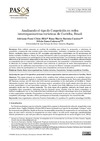Please use this identifier to cite or link to this item:
https://accedacris.ulpgc.es/handle/10553/42407
| DC Field | Value | Language |
|---|---|---|
| dc.contributor.author | Fumi Chim-Miki, Adriana | en_US |
| dc.contributor.author | Batista Canino, Rosa María | en_US |
| dc.contributor.author | Sosa-Cabrera, Silvia | en_US |
| dc.date.accessioned | 2018-11-09T12:16:29Z | - |
| dc.date.available | 2018-11-09T12:16:29Z | - |
| dc.date.issued | 2018 | en_US |
| dc.identifier.issn | 1695-7121 | en_US |
| dc.identifier.uri | https://accedacris.ulpgc.es/handle/10553/42407 | - |
| dc.description.abstract | Este artículo presenta un análisis de variables que indican la propensión a relaciones de coopetición, comparando este contexto entre redes horizontales, verticales o integrales del sector turístico. Fueron recabados datos a través de 287 encuestas empresariales y entrevistas con 26 asociaciones del destino turístico Curitiba en Brasil. Se recoge información sobre la percepción que tiene el empresario de su contexto, lo que promueve su participación en las redes asociativas locales. Los resultados muestran muy poca diferencia en la percepción empresarial en las redes. En los tres tipos de redes la coopetición está más basada en competición que en cooperación, indicando que el empresario, sea competidor o complementario, visualiza la obtención de ventajas tanto individuales como colectivas al participar de redes interorganizativas. La cooperación en los ambientes empresariales es una manera de obtener ventajas competitivas individuales, por tanto, todos los participantes son vistos como competidores en busca de beneficios. | en_US |
| dc.description.abstract | This paper presents an analysis of the variables that indicate propensity to co-opetition using a comparison of horizontal, vertical or comprehensive networks in the tourism sector. Data was collected from 287 business surveys and 26 interviews with tourism associations in the destination of Curitiba in Brazil. Information is given with respect to the business sector's perception of the local context since this gives rise to their participation in local associative networks. The results show little difference in the entrepreneurial perception levels over the various networks. The three types of co-opetition networks are based more on competition than cooperation, indicating that the business sector, whether they be direct competitors or indirect complements are on the lookout for both individual and collective advantages when they participate in inter-organization networks. Cooperation in a business environment is seen as a way to achieve individual competitive advantage; therefore, all the participants are basically competing for the overall benefits. | en_US |
| dc.language | spa | en_US |
| dc.publisher | 1695-7121 | |
| dc.relation.ispartof | Pasos: revista de turismo y patrimonio cultural | en_US |
| dc.source | Pasos. Revista de Turismo y Patrimonio Cultural [ISSN 1695-7121], v. 16 (3), p. 769-784 | en_US |
| dc.subject | 531290 Economía sectorial: turismo | en_US |
| dc.subject.other | Redes interorganizativas | en_US |
| dc.subject.other | Destino turístico | en_US |
| dc.subject.other | Coopetición | en_US |
| dc.subject.other | Ventaja coopetitiva | en_US |
| dc.subject.other | Curitiba | en_US |
| dc.subject.other | Inter-organization networks | en_US |
| dc.subject.other | Tourism destination | en_US |
| dc.subject.other | Co-opetition | en_US |
| dc.subject.other | Co-opetitive advantage | en_US |
| dc.title | Analizando el tipo de Coopetición en redes interorganizativas turísticas de Curitiba, Brasil | en_US |
| dc.title.alternative | Analysing the type of Co-opetition presented in inter-organization tourism networks in Curitiba, Brazil | en_US |
| dc.type | info:eu-repo/semantics/Article | es |
| dc.type | Article | es |
| dc.identifier.doi | 10.25145/j.pasos.2018.16.055 | |
| dc.identifier.isi | 000447195300015 | |
| dc.description.lastpage | 784 | - |
| dc.identifier.issue | 3 | - |
| dc.description.firstpage | 769 | - |
| dc.relation.volume | 16 | - |
| dc.investigacion | Ciencias Sociales y Jurídicas | en_US |
| dc.type2 | Artículo | en_US |
| dc.contributor.daisngid | 4005891 | |
| dc.contributor.daisngid | 4538850 | |
| dc.contributor.daisngid | 9892533 | |
| dc.contributor.wosstandard | WOS:Chim-Miki, AF | |
| dc.contributor.wosstandard | WOS:Batista-Canino, RM | |
| dc.contributor.wosstandard | WOS:Sosa-Cabrera, S | |
| dc.date.coverdate | Julio 2018 | |
| dc.identifier.ulpgc | Sí | es |
| dc.description.sellofecyt | Sello FECYT | |
| dc.description.esci | ESCI | |
| dc.description.fecytq | Q2 | |
| dc.description.fecytpuntuacion | 58,21 | |
| dc.description.dialnetimpact | 0,0 | |
| dc.description.dialnetq | Q1 | |
| dc.description.dialnetd | D3 | |
| dc.description.erihplus | ERIH PLUS | |
| item.grantfulltext | open | - |
| item.fulltext | Con texto completo | - |
| crisitem.author.dept | GIR TIDES: Emprendimiento, Empresa Digital e Innovación | - |
| crisitem.author.dept | IU de Turismo y Desarrollo Económico Sostenible | - |
| crisitem.author.dept | Departamento de Economía y Dirección de Empresas | - |
| crisitem.author.dept | GIR TIDES: Emprendimiento, Empresa Digital e Innovación | - |
| crisitem.author.dept | IU de Turismo y Desarrollo Económico Sostenible | - |
| crisitem.author.dept | Departamento de Economía y Dirección de Empresas | - |
| crisitem.author.orcid | 0000-0001-8841-6112 | - |
| crisitem.author.orcid | 0000-0002-4993-0730 | - |
| crisitem.author.parentorg | IU de Turismo y Desarrollo Económico Sostenible | - |
| crisitem.author.parentorg | IU de Turismo y Desarrollo Económico Sostenible | - |
| crisitem.author.fullName | Batista Canino, Rosa María | - |
| crisitem.author.fullName | Sosa Cabrera, Silvia | - |
| Appears in Collections: | Artículos | |
Page view(s)
68
checked on Apr 27, 2024
Download(s)
50
checked on Apr 27, 2024
Google ScholarTM
Check
Altmetric
Share
Export metadata
Items in accedaCRIS are protected by copyright, with all rights reserved, unless otherwise indicated.
